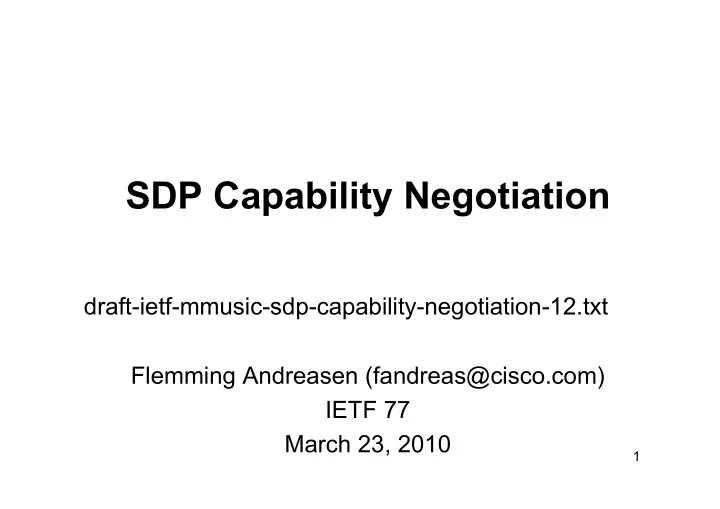

SDP Capability Negotiation draft-ietf-mmusic-sdp-capability-negotiation-12.txt Flemming Andreasen (fandreas@cisco.com) IETF 77 March 23, 2010 1
Progress and Current Status • WGLC completed on -08 (end of 2007) • Chair review resulted in -09 (mid 2008) • General Area and Security Directorate review led to -10 (mid 2009) • IESG review led to -11 and -12 (early 2010) 2
Quick Recap • Problem: – SDP and Offer/Answer model provides only limited capability negotiation – Offer contains actual configuration and cannot specify alternative (potential) configurations • For example: RTP versus SRTP • Solution: – Define backwards compatible SDP and Offer/Answer extensions for capabilities and capability negotiation – Base framework document (this one) defines basic capability negotiation framework including attribute and transport capabilities – Extensions allow for further capabilities and associated 3 procedures (e.g. media capabilities)
Conceptual Model SDP Offer (o1) (actual configuration) Capability 1 Capability 2 Offer … Potential config 1 (o2) Potential config 2 (o3) … SDP Answer (actual configuration, o2) Answer 4
Example Offerer Answerer v=0 � Actual o=- 25678 753849 IN IP4 192.0.2.1 � s= � Configuration c=IN IP4 192.0.2.1 � t=0 0 � m=audio 53456 RTP/AVP 0 18 � Capabilities a=tcap:1 RTP/SAVPF RTP/SAVP RTP/AVPF � a=acap:1 crypto:1 AES_CM_128_HMAC_SHA1_80 � inline:WVNfX19zZW1jdGwgKCkgew... � a=acap:2 rtcp-fb:0 nack � Potential a=pcfg:1 t=1 a=1,[2] � a=pcfg:2 t=2 a=1 � Configurations a=pcfg:3 t=3 a=[2] � Offer Answer v=0 � o=- 24351 621814 IN IP4 192.0.2.2 � s= � c=IN IP4 192.0.2.2 � t=0 0 � Actual m=audio 54568 RTP/AVPF 0 18 � Configuration a=rtcp-fb:0 nack � 5 used from offer a=acfg:1 t=3 a=[2] �
Attributes Defined • Version and Extension Indication Attributes – Supported Capability Negotiation Extensions Attribute ( a=csup ) – Required Capability Negotiation Extensions Attribute ( a=creq ) • Capability Attributes – Attribute Capability Attribute ( a=acap ) – Transport Protocol Capability Attribute ( a=tcap ) – Extension Capability Attributes • Configuration Attributes – Potential Configuration Attribute ( a=pcfg ) – Actual Configuration Attribute ( a=acfg ) 6
Important Changes from IESG Review • Disallowed base framework only implementations from generating media-level attribute capabilities at the session- level – Also added explicit processing rules for how to process them if received (invalid potential configuration). • Disallowed attribute capabilities from embedding capability negotiation parameters and discouraged extension capabilities from similar behavior – Illegal example: a=acap:1 acap:2 foo:a � – Also specified non-recursive processing of capabilities on the receive side as a safeguard • ICE (pending RFC 5245) reference changed to Normative status – Doesn’t mean you have to implement ICE to implement SDP Capability Negotiation 7
Important Changes from IESG Review • ABNF changes to disallow more than 10-digit capability numbers – Syntax consistent with existing semantic restrictions • Changed definition (and ABNF) for attribute-config-list (part of “ a=pcfg ”) to allow for delete-attributes only – i.e., may not reference any attribute capabilities in “ a=pcfg ” • Removed recommendation to use the TIAS bandwidth type [RFC3890] and added note explaining why it should not be used – Currently no good way of specifying bandwidth for different potential configurations with different transport protocols – Worst-case bandwidth can be specified in actual configuration – Extensions can be defined to remedy this 8
Open Issues or Comments • One suggestion to define a new “a=scap” attribute for session-level attributes instead of the current use of “a=acap” (Bob Gilman) – Base framework only implementations MUST NOT provide media- level attributes in session-level “a=acap” – Concern around SDP Capability Negotiation needing to understand whether attributes are session-level or media-level • Inherent SDP issue that does not go away merely by changing the syntax • SDP offerer would still need to ensure no media-level attributes in “ a=scap ” • SDP answerer would still need to validate that session-level attribute capabilities contain session-level attributes (valid potential configuration) – Concern about understanding whether invocation of session-level attribute applies to all media streams or not • Inherent issue with the attribute in question (e.g. “a=key-mgmt” with MIKEY) • Resulting potential configuration SDP looks exactly the same, whether it came from “ a=acap ” or “ a=scap ”. Proposed resolution: No clear benefit, so no change – 9
Open Issues or Comments • One request for editorial clarification on transport capabilities provided at the session-level (Kevin Fleming) – Proposed resolution: Clarify text as suggested (“transport protocol” versus “transport protocol capability”) 10
Recommend
More recommend